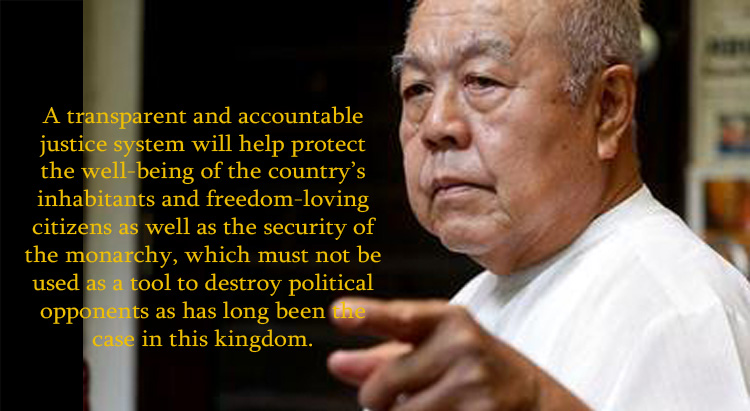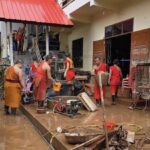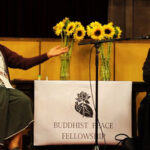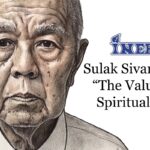
Question: Please tell us about your oral closing statement at the Supreme Administrative Court on 9 July 2013. What was the atmosphere like in the court room?
Answer: In my oral closing statement I respectfully reminded the Court that I had asked my lawyer to submit a written statement to it since 30 January 2013, and the accused party did not object to this act. But the Court did not refer at all to my written statement in its case summary of facts, which was sent to me on 31 May 2013.
The Court responded that it would reconsider my written statement. In my oral closing statement I reiterated the two main points I had made in written form. They are as follows:
1) The state officials in charge of print media in Bangkok, the accused party, did not read my Thai book A Quarter of a Century of Thai Democracy: A Path Filled with Obstacles in its entirety. This book is 272 pages long. They merely quoted excerpts found in pages 1-14, and accused me of lese majeste. They did not specify where I precisely defamed the King. Nor did they explain why or how my words violated the King’s dignity. In sum, their action was not just and not based on the rule of law. These state officials did not act as the protector of the law. Rather, they used the law to oppress the citizens. Furthermore, it seemed that they were serving a certain tyrant who controlled the Thai police. I also pointed out the decision of the Supreme Court in 1995 dismissing the charge of lese majeste against me. It stated that “The wording in the disputed sentences is strong, impolite, and inappropriate. However, when we look at the whole context of the talk and not only parts of it, we can clearly see the intention of the defendant was to give a talk that was respectful and loyal to the monarchy. He did not want any group of people to abuse the monarchy for political purposes.”
This may serve as a legal precedent for the Supreme Administrative Court’s decision. It seemed that the Administrative Court of First Instance did not take the aforementioned Supreme Court’s decision seriously. I felt that it acted like a defender of state officials more than that of freedom-loving citizens.
2) The first accused party alleged that my book disturbed public order citing Article 9 of the 1941 Printing Act. A crucial point is that the book was first published in 2006. One full year had elapsed before I was charged with lese majeste. During 2006-7 there was no evidence that the book caused public disorder or moral degradation. Also the book did not trigger a public uproar against me. On the contrary, several state and private universities as well as organizations and institutions in society invited me to give lectures or share my knowledge—a role I have consistently performed for more than 50 years. If the accused party cannot counter-argue this fact then it shows that the charge pressed against me is unfounded.
If the Supreme Administrative Court takes these two points into consideration, then I am confident of receiving justice.
What I didn’t inform the Supreme Administrative Court was the case in which Police General Charan Chittapanya instructed the Attorney General to prosecute me for lese majeste on 17 December 2004. I had to testify with the police many times. A number of witnesses were also summoned to testify on my behalf. Eventually, the police gave the green light to the Attorney General to prosecute me. But the latter backed down, citing the following reason:
“The testimonies of numerous witnesses, who come from all walks of life, show that after they read the said article in the alleged offender’s subscribed magazine, they were not of the same view that the article’s content defamed the King. Many said that the article had an academic content. Thus it cannot be convincingly said that the said article defamed King Rama IX. Moreover, one of the witnesses could verify that the alleged offender was the author of the said article. They felt that the alleged offender was merely looking for new subscribers to the magazine, which printed the said article. Therefore, the claim that the alleged offender intended to break the law is not substantiated. Additionally, according to the secret and most urgent document of the Advisory Committee on National Security Cases Involving the Monarchy, no. ยธ0200/1328 dated 8 September 2010, the alleged offender is loyal to the monarchy. Based on the available evidence, it cannot be verified that the alleged offender intended to commit the wrongdoing. Therefore, Sulak Sivaraksa, the alleged offender, would not be prosecuted.”
In any case, I believe that the reasoning of the Supreme Administrative Court will be as sound as that of Supreme Court or the Attorney General.
A transparent and accountable justice system will help protect the well-being of the country’s inhabitants and freedom-loving citizens as well as the security of the monarchy, which must not be used as a tool to destroy political opponents as has long been the case in this kingdom.











